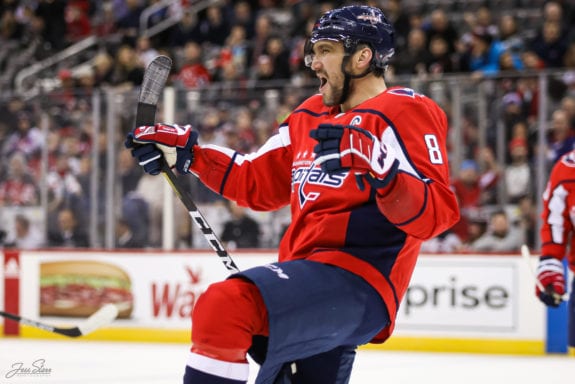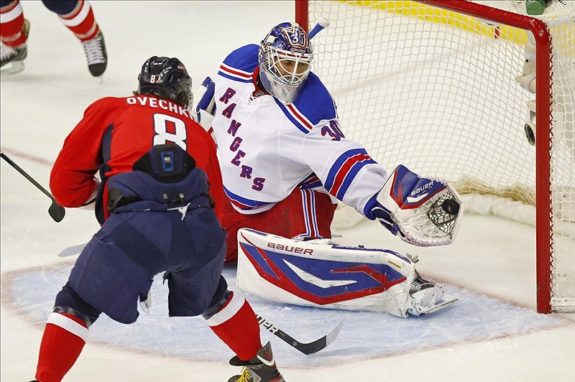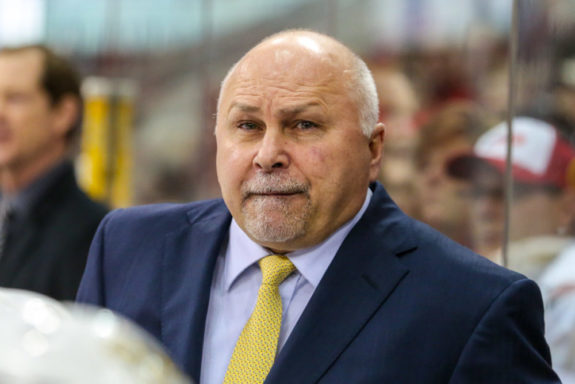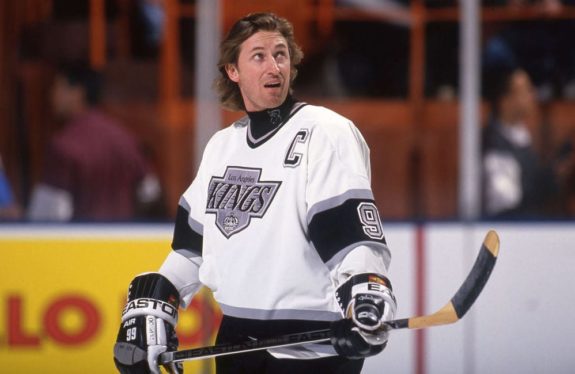Way back in April, about five weeks after the National Hockey League shut down because of the COVID-19 outbreak, Alex Ovechkin appeared on an episode of the NBC’s Hockey at Home television show with Wayne Gretzky. The Washington Capitals’ captain was given one opportunity to ask the Great One anything he wanted.
Ovechkin’s response was not what you might expect.
“Now, in this situation, what would you do if you were in my position to do something like workouts or go outside and play with sticks,” he asked. “{Can I get) some advice from you, because it’s hard right now?”
Times have changed in Washington, D.C.
The Numbers Never Suffered
Flashback to Ovechkin’s younger days when his offseasons traditionally featured one Instagram video after another showing him living his best vacation life from some exotic location around the world.
While we might see videos of Sidney Crosby and Nathan MacKinnon going head to head during intense on-ice workouts from some remote ice rink in Canada, we were often treated to videos of Ovechkin lounging poolside in Miami, boating in Monaco or hanging out with athletes at events like Wimbledon and the World Cup.

There were times when members of the media questioned Ovechkin’s offseason workout regimen and his commitment, while intimating that he had come to training camp overweight or out of shape.
Related: 50 in 50 for Mike Bossy
His numbers on the ice never seemed to suffer – this season he captured his record ninth Maurice “Rocket” Richard Trophy as the NHL’s leading goal-scorer – but something has changed in recent years.
Sure, occasional videos of him wakeboarding or flyboarding still might surface, but those tend to be shot during family vacations and have been accompanied by footage of summer workouts that have been described as insane. The best-life videos have been replaced with clips of his son, Sergei, learning to walk or shooting hockey pucks at home, and of Ovechkin and his wife, Nastya Shubskaya, walking their dog, Blake.
Too Much Too Soon for the Great 8?
When Ovechkin was named Washington’s captain by Bruce Boudreau in January 2010, many voices around hockey could be heard questioning if he was mature enough to take on that responsibility for a team that was developing into a perennial Stanley Cup contender.
Did he command the respect of the veterans? Was he committed enough to playing hard in all three zones to lead by example? Would he be vocal when necessary, be able to say what needed to be said and communicate the right message at the right time? Some even questioned whether he cared enough.

The whispers got louder with each subsequent Capitals’ playoff disappointment, turning into accusations that Ovechkin was a coach killer as Boudreau, Adam Oates and Dale Hunter came and went. There was talk among media and fans as recently as the summer of 2017, the offeseason before the team’s Stanley Cup run, that the Capitals would be better off trading their captain and collecting as many assets as they could for him while his value still was high.
Barry Trotz Sets the Stage
All of that led to an offseason meeting between head coach Barry Trotz and Ovechkin to get on the same page and come to and understanding that they needed each other if the team was ever going to reach its full potential.
The meeting preceded the infamous “We’re not gonna be suck this year” comment made during training camp and quoted by Matthew Paras in The Washington Times prior to the Stanley Cup season after critics suggested the Caps’ championship window had closed and the team’s core group was on the decline. (from ‘Alex Ovechkin: We’re Not Gonna Be Suck This Year’, The Washington Times, 9/15/17)

The usual happy-go-lucky life of the team entered the 2017-18 campaign with a major chip on his shoulder, which resulted in his becoming the first player in the 100-year history of the NHL to open the season with a hat trick in his first two games as he tallied three against Ottawa and four vs. Montreal.
Related: Revisiting the Capitals’ Disastrous Jagr Trade
Ovechkin getting married in the summer of 2016 also seemed to bring a new level of maturity and perspective – as did the birth of his son in August 2018, right in the middle of daddy’s well-documented world victory tour.
Always the Face of the Capitals
To be fair, by all accounts Ovechkin was never a problem in the locker room. He was well-liked by his teammates, and every year as the face of the franchise he manned up in front of all the cameras and microphone every April or May to dejectedly explain what had gone wrong in the postseason.
He was a pillar in the community, who brought smiles to the faces of terminally ill children, electrified the fan base and turned the Washington, D.C. area into one of the fastest-growing metropolitan areas for youth hockey participation in the United States.

In 1982 the future of the Capitals was in doubt. A telethon to literally save the Caps was held to help jumpstart the fan base in hopes of meeting owner Abe Pollin’s requirement that the first 10 games of that season be sold out if the team was going to remain in the nation’s capital. The goal was met, and thanks mostly to a blockbuster trade for Hall of Fame defenseman Rod Langway, the team began a streak of 14 consecutive playoff appearances.
The Caps developed a loyal and devoted following, but hockey was never the hottest ticket in town, until the Great 8 arrived. Fans from other cities would make fun of Washington and say that it would never be a hockey town, but Ovechkin singlehandedly changed that. The team has recorded average attendance exceeding 100 percent capacity every season since 2008-09.
Stanley Cup Cements Ovechkin’s Legacy
But the Russian superstar’s legacy and leadership continued to be questioned right up until the night of June 7, 2018, when NHL Commissioner Gary Bettman handed him hockey’s Holy Grail and Ovechkin was finally able to raise the elusive Cup over his head.
The life changes Ovechkin had experienced in the years leading up to that championship campaign, the fateful meeting with Trotz and the outside criticism lit a fire inside him that refused to be extinguished.
In Alex’s case, he grew as a person, as a leader, defensively. I loved the way he’s grown away from the game. He values his value systems a lot different than it was when he was 21 or 22 years old and turning the league on its ear with his talent and his passion and growing to become a really good leader in the league in the right areas and understanding the balance between all that.
Barry Trotz Via Sportsnet’s Mike Johnston, April 2, 2020
That brings us back to the question Ovechkin asked Gretzky.
Nobody knew what was going to become of the NHL season in April. The COVID situation was getting worse, and while most of North America was in full lockdown, Washington’s captain was asking one of the game’s all-time greats what he should be doing to stay on top of his game.

From Day 1 of the Caps’ Phase 3 training camp Ovechkin brought great energy and intensity, setting the tone for the rest of the team.
“He’s had a very good camp, seems very engaged,” Capitals general manager Brian MacLellan said of Ovechkin in a recent Zoom session with the media from Toronto. “You watch that first (exhibition) game, he’s got a couple goals and a nice assist. He’s serious. He’s pretty much focused on winning a championship. He’s worked hard through camp. He’s been a good leader on and off the ice, so we feel good where he’s at right now.”
Leadership a Strength for the Caps
Back in the days when Ovechkin wasn’t as mature and focused, the team’s personality and postseason performances were an extension of its captain. It wasn’t that Ovechkin didn’t care or wasn’t committed; it was more about him understanding the effect his actions and attitude had on the team.
What once was considered a team weakness has become a strength, which is even more important during these trying and unusual times. The Caps begin postseason play with a 4 p.m. game against Tampa Bay on Aug. 3, almost four months later than the playoffs usually start, at Scotiabank Arena in Toronto.
Related: The Best NHL Forwards Ever – A Lineup for the Ages
“It comes back to our leadership, going through this and handling adversity and our ups and downs are things we’ve been through the last few years and we’ve gotten better at,” Capitals head coach Todd Reirden told reporters during training camp. “And we’ve improved in our room, especially our core guys have. I think we’re prepared for whatever comes our way, and we’re going there with a job in mind and we’re all confident in one another that we can give a great run.”

Washington, which finished the season third in the East based on points percentage, will play three round-robin games against the other teams that concluded the regular season among the Eastern Conference’s top four to determine the order of the seeds once the best-of-five Qualifying Round is completed and the final 16 playoff teams are set.
The Caps played their only pre-tournament exhibition game July 29, defeating the Carolina Hurricanes, 3-2, with Ovechkin predictably factoring in on all three goals. Whatever advice Gretzky gave him must have worked, because the captain looked like he hadn’t missed a beat.
We need the games to feel the puck, the ice and your linemates. We’ve been practicing a lot, but it’s different in the game. It’s a total different speed … First, it’s most important to go out and feel good about ourselves and then try to see the connections – the power play, PK, all those little details, because in practice it’s a total different speed and total different game.
Alex Ovechkin to reporters after Caps July 29 exhibition game
A few years ago that adjustment might have been a problem for Ovechkin and the Caps, but as long as the team continues to follow the lead of its captain, everything should turn out just fine.